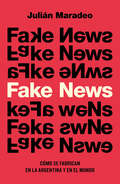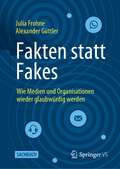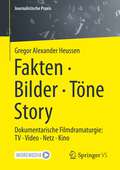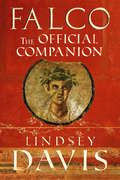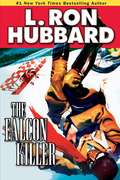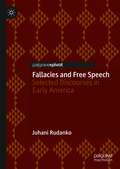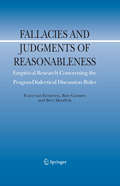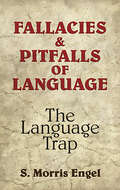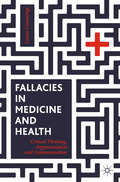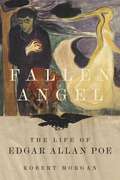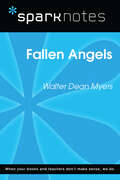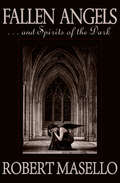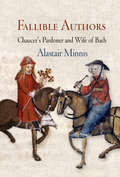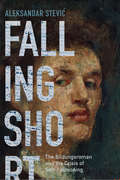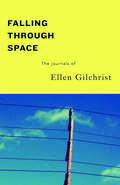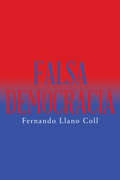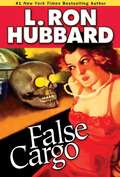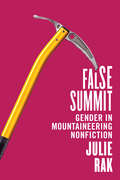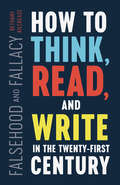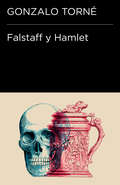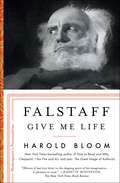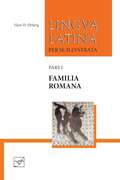- Table View
- List View
Fake news: Cómo se fabrican en la Argentina y en el mundo
by Julián MaradeoA partir de casos locales y del mundo, el libro cuenta la historia de las noticias falsas, de cómo nos ponen en estado de alerta y, al mismo tiempo, refleja la debilidad estatal, la falta de control y el enorme lobby alrededor de ellas. La imagen de una chica con su bebé en brazos mientras carga en la espalda una caja térmica de delivery es la punta del iceberg de un fenómeno que sacudió las nociones de verdad y mentira: las fake news. Todos estamos expuestos y a la vez las reproducimos hasta convertirlas en pandémicas. Sus consecuencias pueden alterar elecciones, decisiones de gobierno e incluso provocar muertes. A partir de casos locales y del mundo, el libro cuenta la historia de las noticias falsas, de cómo nos ponen en estado de alerta y, al mismo tiempo, reflejan la debilidad estatal, la falta de control y el enorme lobby alrededor de ellas. «Esta investigación -dice Julián Maradeo- trata sobre otra forma de ejercer el poder. Una que es imperceptible, escurridiza, placentera y extraterritorial. Una que jaquea a todas las teorías que discurrieron por siglos al respecto. Una en la que interviene un lenguaje que resulta ajeno, sujetos que parecen salidos de una película, geografías remotas. Una que pone en entredicho las reglas del juego democrático. Las noticias falsas no discriminan entre Oriente y Occidente, afectan a todos sin mirar a quién».
Fakten statt Fakes: Wie Medien und Organisationen wieder glaubwürdig werden
by Julia Frohne Alexander GüttlerFake News, PR-Skandal, Mainstream-Presse – diese Schlagworte kennzeichnen vor allem eines: den Vertrauensverlust der Öffentlichkeit in die Berichterstattung von Medien und Unternehmen. In einem nahezu unentwirrbaren Kommunikationsdschungel aus Medien, Internetportalen und sozialen Plattformen wird es nicht nur für Laien immer schwieriger, verlässliche und unseriöse Kommunikation voneinander zu unterscheiden.So steigt die Anzahl derer, die professioneller Kommunikation mit Misstrauen begegnen und in ihr vor allem Einflussnahme oder gar Manipulation sehen. Aus den Augen gerät dabei oft, dass Deutschland über eines der freiheitlichsten und vielfältigsten Mediensysteme der Welt verfügt.Das Buch diskutiert die Grenzen zwischen Manipulation und Kommunikation on- wie offline und zeigt, wie man schlampige und seriöse Meinungsmacher unterscheidet, welche Rolle Fakten spielen und wie Medien und Unternehmen dazu beitragen können, dass Glaubwürdigkeit in der medialen Debatte wieder einen Stellenwert bekommt.
Fakten · Bilder · Töne · Story: Dokumentarische Filmdramaturgie: TV · Video · Netz · Kino (Journalistische Praxis)
by Gregor Alexander HeussenDokumentarische Filme aller Genres in TV, Kino und Netz entfalten ihre informative Kraft erst dann, wenn sie dramaturgisch als Erzählungen strukturiert sind, nicht als Aufzählungen. Sie müssen die Emotionen des Publikums wecken, damit die filmische Information verstanden werden kann. Wirksame dokumentarische Filmgestaltung ist begründet in der Art, wie Menschen hinschauen und hinhören. Ihre Wahrnehmungen werden zu Vorstellungen; diese prägen die Information. Dadurch verändern sich viele überkommene Regeln für Dokumentarische Filme. Neue Ideen werden möglich. Werkzeuge dafür sind der Erzählsatz, die Roten Fäden, die Drama-Elementarmuster, das konzentrierte Zusammenspiel der sechs filmischen Erzähler, Emotionsziel und Argumentziel und die für Erzählungen charakteristische Polaritätslogik. Anders als fiktionale Filme müssen Dokumentarische Filme durch ihre erzählerische Struktur und filmische Gestaltung einen nachprüfbaren Bezug zur Lebensrealität des Publikums schaffen. Spielfilme hingegen können in ihrem jeweils definierten Erzählkosmos plausibel und authentisch sein. Im Dokumentarischen lassen sich auch Werkzeuge und Muster der Fiktionalen Dramaturgie nutzen, aber mit anderer Absicht und Wirkung: sie müssen die Lebensrealität treffen. Das Buch von Gregor Alexander Heussen zeigt Dokumentarische Dramaturgie praktisch; und begründet sie mit Erkenntnissen der Kognitionswissenschaft. Redakteure* und Film-Auftraggeber* finden Werkzeuge und Denkwege für Planung, und Filmabnahme. Autoren* erfahren die Kraft der dramaturgischen Recherche und entdecken neue Gestaltungsmöglichkeiten bei Dreh und Montage. Das Buch ist ein Muss für alle, die sich für dokumentarischen Film in TV, Kino, Netz und Unternehmen interessieren. Mit dem Buch sind 29 runterladbare, sofort nutzbare Drama-Werkzeuge verlinkt.
Falco: The Official Companion
by Lindsey DavisOne of the stories from the bestselling historical fiction Falco series.As the girl came running up the steps, I decided she was wearing far too many clothes...So, in 1989, readers were introduced to Marcus Didius Falco, the Roman informer, as he stood on the steps of the Temple of Saturn, looking out across the Forum: the heart of his world. Twenty years and twenty books later, Falco fans want a companion volume.Only here will you learn the author's private background, including her descent from a failed assassin and how atheism improved her knitting. Here too are the real glories and heartache involved in research and creation: why the baby had to be born in Barcelona, which plots evolved from intense loathing of management trainees, what part a thermal vest played in the iconic Falco's conception. It can't be a complete handbook to ancient Rome, but it covers perennial issues. There are a hundred illustrations, some specially commissioned, others from family archives. Enlightening quotations come from the Falco books and from eminent sources: Juvenal, through Chandler, to 1066 and All That.Readers have asked for this book. Their paranoid, secretive author agrees it is now or never. Time to spill beans on the travertine...
Falcon Killer, The
by L. Ron HubbardEnjoy this gripping and gritty tale. China's war ace, a fighter pilot nicknamed "The Falcon Killer (Tzun Kai)," is actually Bill Gaylord, raised in Peking by his American parents. Gaylord lost both of them as a child during the violent Boxer uprising and then saw his foster family slaughtered in wartime. With a past that's hardened his soul and given him nerves of steel, Gaylord has used his resolve to down more Japanese aircraft than can be counted.When he's not hunting down enemy planes, intrigue constantly follows him--stars of Tzun's rogues gallery include an agent provocateur and a despotic Chinese warlord. Soon enough, events pit Gaylord against a Japanese spy who has caused untold trouble for the Chinese. Gaylord must somehow find and defeat him or risk losing an ancient Chinese kingdom to the land of the rising sun. "Hubbard writes with his usual gusto ('Wings in the sky had passed their shadows over the land to drop their acrid death'), and Gaylord is a typical Hubbard hero, tough and wily but also introspective and romantic." --Booklist
Fallacies and Free Speech: Selected Discourses in Early America
by Juhani RudankoThis book offers a new perspective on selected discourses and texts bearing on the evolution of a distinctively American tradition of free speech. The author’s approach privileges fallacy theory, especially the fallacy of ad socordiam, in a key Congressional debate in 1789 and other forms of verbal manipulation in newspaper editorials during the War of 1812. He argues that in order to understand James Madison’s role in the evolution of a broad conception of freedom of speech, it is imperative to examine the nature of the verbal attacks targeted at him. These attacks are documented, analyzed with the concept of aggravated impoliteness, and used to demonstrate that it was Madison’s toleration of criticism, even in wartime, that provided a foundation for a broad conception of freedom of speech. This book will be of interest to both scholars and lay readers with an interest in the application of discourse analysis and historical pragmatics to political debates, argumentation theory and fallacy theory, and the evolution of the concept of freedom of speech in the early years of the United States.
Fallacies and Judgments of Reasonableness
by Bert Meuffels Frans H. van Eemeren Bart GarssenIn Fallacies and Judgments of Reasonableness, Frans H. van Eemeren, Bart Garssen and Bert Meuffels report on their systematic empirical research of the conventional validity of the pragma-dialectical discussion rules. The experimental studies they carried out during more than ten years start from the pragma-dialectical theory of argumentation developed at the University of Amsterdam, their home university. In these studies they test methodically the intersubjective acceptability of the rules for critical discussion proposed in this theory by confronting ordinary arguers who have not received any special education in argumentation and fallacies with discussion fragments containing both fallacious and non-fallacious argumentative moves. The research covers a wide range of informal fallacies. In this way, the authors create a basis for comparing the theoretical reasonableness conception of pragma-dialectics with the norms for judging argumentative moves prevailing in argumentative practice. Fallacies and Judgments of Reasonableness provides a unique insight into the relationship between theoretical and practical conceptions of reasonableness, supported by extensive empirical material gained by means of sophisticated experimental research.
Fallacies and Pitfalls of Language: The Language Trap (Dover Language Guides)
by S. Morris EngelAs S. Morris Engel alerts us in this eye-opening book, we risk falling into potentially harmful language traps every moment. Not just the occasional malapropism or grammatical faux pas, but a more sinister kind -- distortions of meaning that would persuade us to believe something that may not be true.Sometimes these language traps are set for us deliberately by politicians, advertisers, journalists, lawyers or other professional persuaders. Sometimes they are set inadvertently by our friends, our loved ones -- even ourselves. This work explains how and why these fallacies work, and how we may suffer the consequences when they do.Day after day we listen to government newspeak (our troops are called "peace-keeping forces"), exaggerated advertising claims from "leading authorities," twisted logic and misleading propaganda. We are treated to more and more euphemisms (slums are called "substandard housing"; dogcatchers, "animal welfare officers"). We encounter innumerable ambiguities ("I wish you all the good fortune you deserve") -- and indulge in a few ourselves. The author wittily explores this verbal minefield, and tells us how to spot a language trap and how to avoid falling in.The book is not only a useful manual of verbal self-defense, it's an engrossing study of the nature of language and the subtle ways in which it operates. It will intrigue anyone interested in words, language, and the dynamics of modern culture.
Fallacies in Medicine and Health: Critical Thinking, Argumentation and Communication
by Louise CummingsThis textbook examines the ways in which arguments may be used and abused in medicine and health. The central claim is that a group of arguments known as the informal fallacies – including slippery slope arguments, fear appeal, and the argument from ignorance – undertake considerable work in medical and health contexts, and that they can in fact be rationally warranted ways of understanding complex topics, contrary to the views of many earlier philosophers and logicians. Modern medicine and healthcare require lay people to engage with increasingly complex decisions in areas such as immunization, lifestyle and dietary choices, and health screening. Many of the so-called fallacies of reasoning can also be viewed as cognitive heuristics or short-cuts which help individuals make decisions in these contexts. Using features such as learning objectives, case studies and end-of-unit questions, this textbook examines topical issues and debates in all areas of medicine and health, including antibiotic use and resistance, genetic engineering, euthanasia, addiction to prescription opioids, and the legalization of cannabis. It will be useful to students of critical thinking, reasoning, logic, argumentation, rhetoric, communication, health humanities, philosophy and linguistics.
Fallen Angel: The Life of Edgar Allan Poe
by Robert MorganOver 170 years after his death, Edgar Allan Poe remains a figure of enduring fascination and speculation for readers, scholars, and devotees of the weird and macabre. In Fallen Angel, acclaimed novelist and poet Robert Morgan offers a new biography of this gifted, complicated author.Focusing on Poe’s personal relationships, Morgan chronicles how several women influenced his life and art. Eliza Poe, his mother, died before he turned three, but she haunted him ever after. The loss of Elmira Royster Shelton, his first and last love, devastated him and inspired much of his poetry. Morgan shows that Poe, known for his gothic and supernatural writing, was also a poet of the natural world who helped invent the detective story, science fiction, analytical criticism, and symbolist aesthetics. Though he died at age forty, Poe left behind works of great originality and vision that Fallen Angel explores with depth and feeling.
Fallen Angels (SparkNotes Literature Guide Series)
by SparkNotesFallen Angels (SparkNotes Literature Guide) by Walter Dean Myers Making the reading experience fun! Created by Harvard students for students everywhere, SparkNotes is a new breed of study guide: smarter, better, faster.Geared to what today's students need to know, SparkNotes provides:chapter-by-chapter analysis explanations of key themes, motifs, and symbols a review quiz and essay topics Lively and accessible, these guides are perfect for late-night studying and writing papers.
Fallen Angels and Related Readings (Literature Connections)
by Walter Dean MyersApart from the novel on Vietnam war - Fallen Angels - this book features rare letters from soldiers on their life and condition in war zone, letters to families and poems about the veterans who lost their lives.
Fallen Angels: . . . And Spirits of the Dark
by Robert Masello&“My name is Legion: for we are many.&” —Mark 5:9 They have been with us since the beginning of time. Walking the centuries in our myths, our art, our literature . . . and in our dreams. Victims of temptation and sin, they are spirits who fell from heaven&’s grace, emerging anew as servants of darkness. Here, in one spellbinding volume, are the most infamous denizens of the Underworld—from Lucifer, the first angel who challenged God&’s will, to the fathomless legions of demons and fiends who haunt us to this day. Explore their world, hear their stories, unravel their secrets, and discover for yourself that even angels can have a dark side . . .
Fallible Authors
by Alastair MinnisCan an outrageously immoral man or a scandalous woman teach morality or lead people to virtue? Does personal fallibility devalue one's words and deeds? Is it possible to separate the private from the public, to segregate individual failing from official function? Chaucer addressed these perennial issues through two problematic authority figures, the Pardoner and the Wife of Bath. The Pardoner dares to assume official roles to which he has no legal claim and for which he is quite unsuited. We are faced with the shocking consequences of the belief, standard for the time, that immorality is not necessarily a bar to effective ministry. Even more subversively, the Wife of Bath, who represents one of the most despised stereotypes in medieval literature, the sexually rapacious widow, dispenses wisdom of the highest order.This innovative book places these "fallible authors" within the full intellectual context that gave them meaning. Alastair Minnis magisterially examines the impact of Aristotelian thought on preaching theory, the controversial practice of granting indulgences, religious and medical categorizations of deviant bodies, theological attempts to rationalize sex within marriage, Wycliffite doctrine that made authority dependent on individual grace and raised the specter of Donatism, and heretical speculation concerning the possibility of female teachers. Chaucer's Pardoner and Wife of Bath are revealed as interconnected aspects of a single radical experiment wherein the relationship between objective authority and subjective fallibility is confronted as never before.
Falling Short: The Bildungsroman and the Crisis of Self-Fashioning
by Aleksandar StevićA paradox haunts the bildungsroman: few protagonists successfully complete the process of maturation and socialization that ostensibly defines the form. From the despondent endings of Dickens’s Great Expectations and Meredith’s The Ordeal of Richard Feverel to the suicide of Balzac’s Lucien de Rubempré and the demise of Eliot’s Maggie and Tom Tulliver, the nineteenth-century bildungsroman offers narratives of failure, paralysis, and destruction: goals cannot be achieved, identities are impossible to forge, and the narrative of socialization routinely crumbles. Examining the novels of Stendhal, Honoré de Balzac, Charles Dickens, Charlotte Brontë, Henry James, Samuel Butler, James Joyce, and Marcel Proust, Falling Short reveals not only a crisis of character development but also a crisis of plotting and narrative structure. From the inception of literary realism in the 1830s to the height of modernism a century later, the bildungsroman presents itself as a key symptom of modern Europe’s inability to envision either coherent subjectivity or successful socialization. Rather than articulating an arc of personal development, Stević argues, the bildungsroman tends to condemn its heroes to failure because our modern understanding of both individual subjectivity and social success remains riddled with contradictions. Placing primary texts in conversation with the central historical debates of their time, Falling Short offers a revisionist history of the realist and modernist bildungsroman, unearthing the neglected role of defeat in the history of the genre.
Falling Through Space
by Ellen GilchristEnhanced with fifteen new essays, the benchmark of an acclaimed writer's spunk and sense of place<P> Ellen Gilchrist has amassed a nationwide following, and her readers eagerly anticipate each new short story collection and novel. The sassy and moving commentaries she recorded for National Public Radio were a large part of the original kindling for this intense interest.<P> In Falling Through Space the spark that first attracted this audience flashes again in fifty-eight short essays drawn from those enormously successful broadcasts. To update and continue the dialogue she has always maintained with her fans, Gilchrist has added fifteen new essays.<P> Originally published in 1987 by Little, Brown and Company, Falling Through Space provides a funny and intimate diary of a writer's self-discovery. Author of more than a dozen books and winner of the National Book Award, Gilchrist is a beloved and distinctive southern voice whose life and memories are every bit as entertaining as the wild and poignant short stories for which she is famous.<P> The short essays that anchor this book vividly explore the Mississippi plantation life of her childhood; the books, teachers, and artists who influenced her development; and her thoughts about writing and life in general. Coupled with forty-two pictures from Gilchrist's youth and adulthood, these slices of life create a running autobiography.<P> In new essays, originally published in such magazines as Vogue, Outside, New Woman, and the Washington Post Sunday Magazine, Gilchrist reveals her origins, influences, and the way she works when she writes. Required reading for any fan, this book is Ellen Gilchrist at her funniest and best. For her readers it confirms her spontaneity and her talent for finding life at its zaniest and brightest.<P> Ellen Gilchrist is the author of several collections of short stories and novellas including: The Cabal and Other Stories, Flights of Angels, The Age of Miracles, The Courts of Love, In the Land of Dreamy Dreams, Victory Over Japan (winner of the National Book Award), Drunk With Love, and I Cannot Get You Close Enough. She has also written several novels, including The Anna Papers, Net of Jewels, Starcarbon, and Sarah Conley. Her 1994 novel, Anabasis: A Journey to the Interior, was published by University Press of Mississippi. She lives in Fayetteville, Arkansas, and Ocean Springs, Mississippi.
Falling into Matter
by Elizabeth R. NapierFalling into Matter examines the complex role of the body in the development of the English novel in the eighteenth century. Elizabeth R. Napier argues that despite an increasing emphasis on the need to present ideas in corporeal terms, early fiction writers continued to register spiritual and moral reservations about the centrality of the body to human and imaginative experience.Drawing on six works of early English fiction -- Daniel Defoe's Robinson Crusoe, Jonathan Swift's Gulliver's Travels, Samuel Richardson's Clarissa, Henry Fielding's Tom Jones, Elizabeth Inchbald's A Simple Story, and Mary Shelley's Frankenstein - Napier examines how authors grappled with technical and philosophical issues of the body, questioning its capacity for moral action, its relationship to individual freedom and dignity, and its role in the creation of art. Falling into Matter charts the course of the early novel as its authors engaged formally, stylistically, and thematically with the increasingly insistent role of the body in the new genre.
Falsa democracia
by Fernando Llano CollCríticas verdaderas sin piedad para los políticos, banqueros, juristas y demás ladrones de corbata que han pervertido la democracia. El tema de este libro es un breve resumen de lo acaecido en una hipotética tertulia desde el año 2000 hasta mediados de 2015, donde cada uno de los 70 personajes de acorde a sus ideas políticas, morales o religiosas se apoya o expone sus creencias y opiniones y discute si alguien las tiene opuestas a las suyas. Duros comentarios y críticas sobre los temas de actualidad que exponen los periódicos. Se discute de política, moralidad, homosexualidad, soluciones a la crisis, cambio del clima de España, religión, reindustrialización de la nación, del disparatado y dilapidador comportamiento de las comunidades, que se han convertido en un pozo sin fondo para derrochar dinero, manteniendo a 2.000.000 de parientes, amigos y amantes en empleos o empresas inútiles con excelentes sueldos de nuestros impuestos. Miles y miles de millones que no justifican y siempre piden más porque se han pasado en los gastos. El gobierno sin controlar esos gastos con una auditoria anual les sigue dando sin explicar al pueblo la causa por la que no para de esquilmar el erario público para satisfacer las exigencias de aquellos, parece que o bien está de acuerdo y se lleva una comisión, o se trata de que saben cosas de su partido y les hacen chantaje. En esta corrompida democracia cualquier cosa puede suceder.
False Cargo
by L. Ron HubbardDiscover intrigue. Brent Calloway is hired by an insurance firm to board a cargo vessel undercover and ensure it makes its way to San Diego in one piece. Once the voyage is underway, Calloway finds fraud, a pattern of organized scuttlings and the true fate of another vessel captained by an old friend. But when Calloway's true identity is revealed, he must fight for his life--and the real danger begins. ALSO INCLUDES THE ADVENTURE STORY "GROUNDED""...one of the great pulp writers, with colorful prose, lively action writing, exotic locales, fresh variations on standard characters and situations, and well-constructed plots."--Ellery Queen
False Summit: Gender in Mountaineering Nonfiction
by Julie RakThe race to climb Everest catapulted mountain climbing, with its accompanying images of conquest and sport, into the public sphere on a global scale. But as a metaphor for the pinnacle of human achievement, mountaineering remains the preserve of traditional white male heroism.False Summit unpacks gender politics in the expedition narratives and memoirs of mountaineers in the Himalayas and the Karakoram. Why are women still a minority in the world's highest places? Julie Rak proposes that the genre has itself reached a "false summit" – a peak that proves not to be the pinnacle – and that mountaineering is not ready to welcome other ways of climbing or other kinds of climbers. For more than two centuries mountaineering, as an activity and as an ideal, has helped shape how the self is understood within the context of conquest, adventure, and proximity to risk. As climbing shows signs of becoming more diverse, Rak asks why change is so hard to achieve and why gender bias and other inequities exist in climbing at all.Exploring classic and lesser-known expedition accounts from Everest, K2, and Annapurna, False Summit helps us understand why mountaineering remains one of the most important ways to articulate gender identities and politics.
Falsehood and Fallacy: How to Think, Read, and Write in the Twenty-First Century
by Bethany KilcreaseFalsehood and Fallacy shows students how to evaluate what they read in a digital age now that old institutional gatekeepers, such as the media or institutions of higher education, no longer hold a monopoly on disseminating knowledge. Short chapters cover the problems that exist as a result of the current flow of unmediated information, Fake News, and bad arguments, and demonstrate how to critically evaluate sources – particularly those that appear online. Kilcrease provides a range of tools to help students evaluate the legitimacy of what they read. She discusses how to be on the lookout for bad arguments and logical fallacies and explains how students can produce clear and convincing academic writing. Exercises are included throughout the book to test student knowledge. Written in a positive style and full of useful tools and exercises, Falsehood and Fallacy embraces the idea that everyone is a writer and has aptitude for further growth.
Falstaff y Hamlet (Colección Endebate #Volumen)
by Gonzalo TornéUn fascinante ensayo sobre dos personajes fundamentales de Shakespeare que no terminan de encajar en su contexto. Hay una clase de personajes que tienen una función narrativa distinta a la del resto: no tienen carne ni sangre, están hechos de palabras como el resto de personajes, pero parecen pertenecer a otro plano de la realidad: saben muchas cosas y actúan como un motivador contratado para dinamizar la obra. El lector reconoce en su perfil desdibujado que tienen un pie fuera (por enfermedad, por mayor experiencia, por pertenecer a un rango social inferior) del escenario común donde actúan el resto de figuras: su función narrativa consiste en propiciar la acción, en cometerla, en actuar como directores de escena vicarios. En este audaz ensayo Gonzalo Torné, tan brillante novelista como perspicaz crítico, propone una lectura de Shakespeare en la que Falstaff y Hamlet inauguran esa estirpe, que más tarde recogerán autores como Henry James, Iris Murdoch o John Coetzee.
Falstaff: Give Me Life (Shakespeare's Personalities #1)
by Harold BloomFrom Harold Bloom, one of the greatest Shakespeare scholars of our time comes &“a timely reminder of the power and possibility of words [and] the last love letter to the shaping spirit of Bloom&’s imagination&” (front page, The New York Times Book Review) and an intimate, wise, deeply compelling portrait of Falstaff—Shakespeare&’s greatest enduring and complex comedic characters.Falstaff is both a comic and tragic central protagonist in Shakespeare&’s three Henry plays: Henry IV, Parts One and Two, and Henry V. He is companion to Prince Hal (the future Henry V), who loves him, goads, him, teases him, indulges his vast appetites, and commits all sorts of mischief with him—some innocent, some cruel. Falstaff can be lewd, funny, careless of others, a bad creditor, an unreliable friend, and in the end, devastatingly reckless in his presumption of loyalty from the new King. Award-winning author and esteemed professor Harold Bloom writes about Falstaff with the deepest compassion and sympathy and also with unerring wisdom. He uses the relationship between Falstaff and Hal to explore the devastation of severed bonds and the heartbreak of betrayal. Just as we encounter one type of Anna Karenina or Jay Gatsby when we are young adults and another when we are middle-aged, Bloom writes about his own shifting understanding of Falstaff over the course of his lifetime. Ultimately we come away with a deeper appreciation of this profoundly complex character, and this &“poignant work&” (Publishers Weekly, starred review) as a whole becomes an extraordinarily moving argument for literature as a path to and a measure of our humanity. Bloom is mesmerizing in the classroom, wrestling with the often tragic choices Shakespeare&’s characters make. &“In this first of five books about Shakespearean personalities, Bloom brings erudition and boundless enthusiasm&” (Kirkus Reviews, starred review) and his exhilarating Falstaff invites us to look at a character as a flawed human who might live in our world.
Fame and Failure 1720-1800
by Adam RounceAdam Rounce presents a colourful and unusual history of eighteenth-century British literature, exploring ideas of fame through writers who failed to achieve the literary success they so desired. Recounting the experiences of less canonical writers, including Richard Savage, Anna Seward and Percival Stockdale, Rounce discusses the inefficacy of apparent literary success, the forms of vanity and folly often found in failed authorship, and the changing perception of literary reputation from the beginning of the eighteenth century to the emergence of Romanticism. The book opens up new ways of thinking about the nature of literary success and failure, given the post-Romantic idea of the doomed creative genius, and provides an alternative narrative to critical accounts of the famous and successful.
Familia Romana (Lingua Latina #Book One)
by Hans H. ØrbergHans Ørberg's Lingua Latina per se Illustrata is the world's premiere series for learning Latin via the Natural Method. The Natural Method encourages students to learn Latin without resorting to translation, but instead by teaching them to think in the language: students first learn grammar and vocabulary inductively through extended contextual reading and an ingenious system of marginal notes. Lingua Latina per se Illustrata is also the most popular series for those teachers at both the secondary and collegiate levels who wish to develop Latin conversational skills in the classroom. <p><p>Familia Romana (the main book of Pars I of the Lingua Latina per se illustrata series) contains thirty-five chapters and describes the life of a Roman family in the 2nd century A.D. It culminates in readings from classical poets and Donatus's Ars Grammatica, the standard Latin school text for a millennium. Each chapter is divided into two or three lessons (lectiones) of a few pages each followed by a grammar section (Grammatica Latina) and three exercises (Pensa). Hans Ørberg's impeccable Latin, humorous stories, and the Peer Lauritzen illustrations, reproduced in full color, make this work a classic. The book also includes a table of declensions, a Roman calendar, and a word index (index vocabulorum). <p><p>The Lingua Latina series incorporates the following features: <p><p>The most comprehensive treatment of Latin grammar available in an elementary textbook. <p><p>A vocabulary of almost 1,800 words, reinforced by constant and creatively phrased repetition, vastly expands the potential for later sight reading. <p><p>A complete line of ancillary volumes, exercises, and readers both in print and online.
